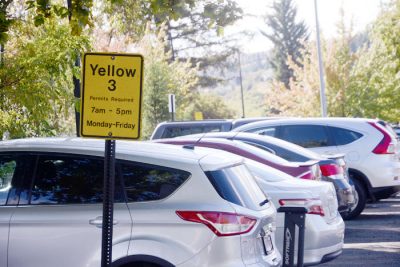WSU Transportation Services increases parking permit rates
Permit price increases will fund various projects; parking lots expected to fill this academic year

Transportation Services plans to use permit revenue to complete several projects such as filling cracks, painting, repairing parking garages, structures, and surface lots as well.
July 9, 2021
WSU Transportation Services plans to use revenue from increased parking permit rates to catch up on several projects delayed because of the pandemic.
The 10 percent average parking rate increase was supposed to go into effect last year, but was delayed to July 1 because of the pandemic, said Chris Boyan, Transportation Services associate director.
“Our main source of revenue comes from people who purchase parking [permits],” Boyan said. “There were a lot of people who did not purchase [permits], so we took a bit of a financial hit like many departments.”
Currently, parking permit renewals are available for people who purchased a permit this past academic year, he said. On July 20, open permit sales will become available for students living on and off-campus.
Individuals living in residence halls can purchase crimson, gray or blue parking permits. People living off-campus can purchase the orange, green, yellow, red or blue parking permits, Boyan said.
Parking permit prices vary, said Cody Wilson, Transportation Services customer service, administration and marketing/outreach manager. The orange permit is the most expensive option costing approximately $776, while the least expensive is the blue permit costing around $145.
Parking lots are expected to fill up this coming academic year like prior to the pandemic, Wilson said. Transportation Services plans to use permit revenue to complete several projects such as filling cracks, painting, repairing parking garages, structures, and surface lots as well.
“As the cost of maintaining those things rises, we obviously have to increase our permit prices to cover that cost,” he said.
The department’s budget for the upcoming year will come out later this month, Wilson said.
Transportation Services in the process of removing parking meters around campus and installing pay stations, alleviating the department’s budget. There are over 100 parking meters on campus and it costs around $500 to replace each one, totaling around $50,000, Boyan said.
In addition, Transportation Services is promoting the AIMS MobilePay app. Wilson said the app sends a notification 15 minutes before parking expires, asking the user if they would like to extend their time.
“Technology is really good as long as the app works right,” Boyan said. “Fortunately for us, that type of technology has become more and more reliable.”
Transportation Services hopes to expand short-term hourly parking options for individuals who are on campus less often by increasing lot availability, Boyan said. The department plans to have a pilot program ready for fall 2022.









